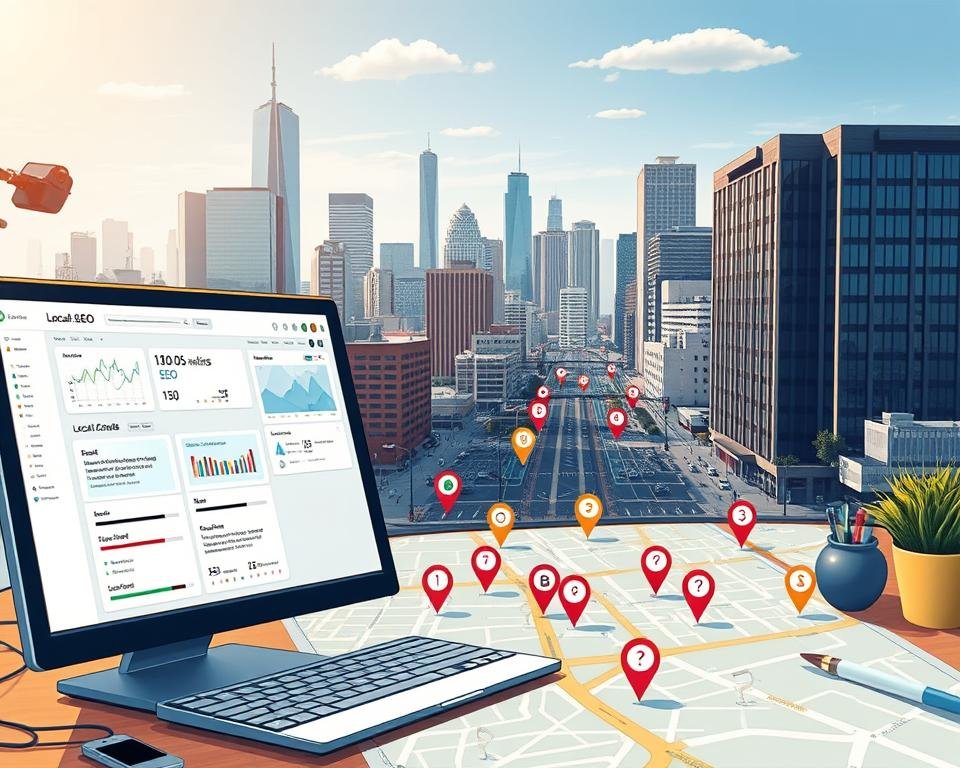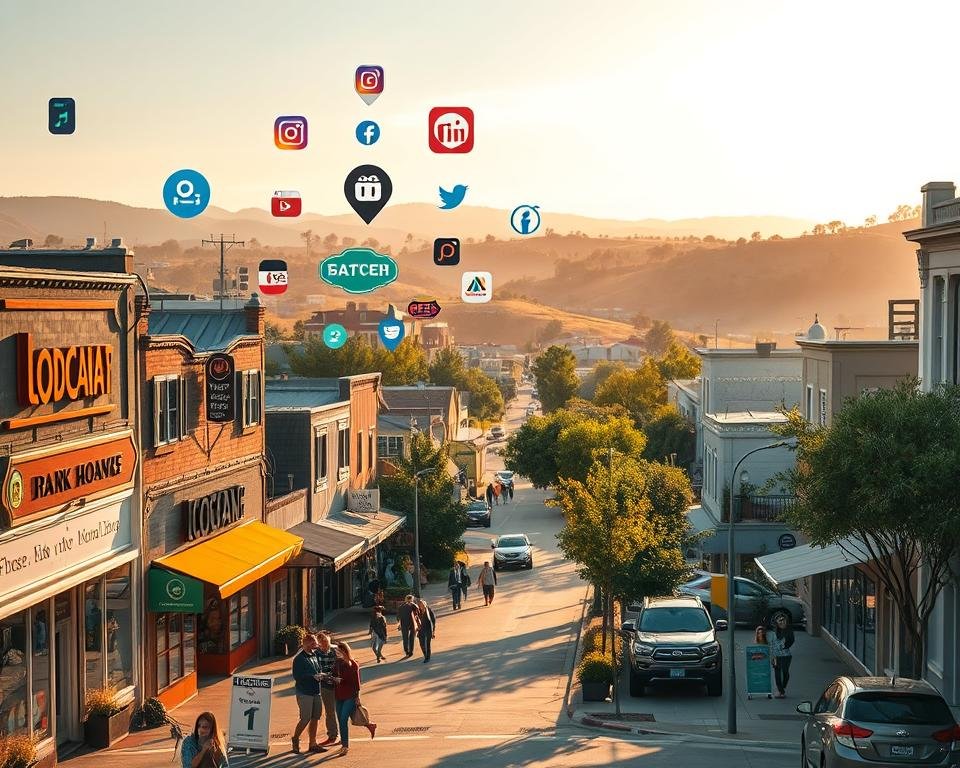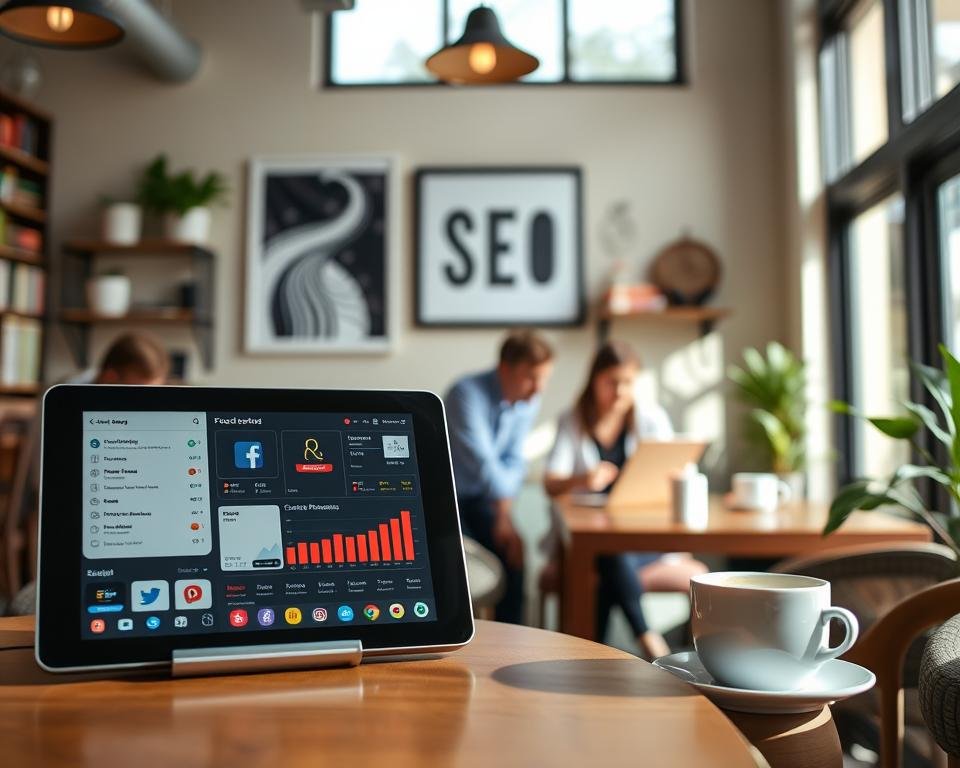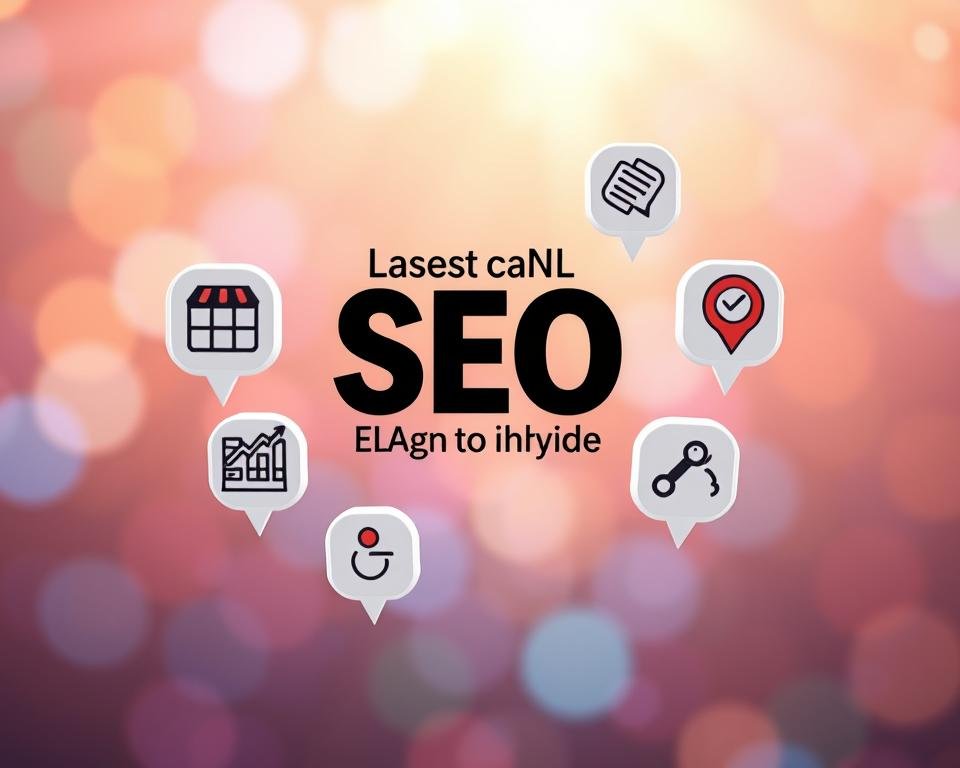As a business owner, knowing about local search engine optimization is key. It helps improve your online presence and draw in more customers. In today’s digital world, having a strong online plan is essential to reach local people.
I will share the main things that affect your site’s visibility in local searches. By improving these local SEO ranking factors, you can boost your site’s ranking. This will bring more people to your site who are looking for what you offer.
Key Takeaways
- Understand the significance of local search engine optimization for your business.
- Learn how to optimize your website for local search results.
- Discover the key factors that influence local SEO rankings.
- Improve your online visibility and attract more local customers.
- Enhance your website’s ranking with targeted local SEO strategies.
Understanding Local SEO
In today’s world, local SEO is key for businesses to shine in their local markets. Knowing local SEO basics is vital for a good online marketing plan. This plan draws in local customers.
What is Local SEO?
Local SEO makes a website show up more in local search results. It uses strategies to boost a business’s local search visibility. Effective local SEO gets a business seen when people search for things nearby.
Optimizing for local search brings more people to your site. It also gets more people to visit your store.
Importance of Local SEO for Businesses
Local SEO is a must for businesses that need local customers. It makes a business show up in local searches. This means more people see what they offer.
Using local SEO tips can really help a business. It can bring in more sales and money. Local SEO keeps a business ahead in its local market.
Google My Business Optimization
Google My Business is a powerful tool. It can greatly improve your local search rankings. Claiming and optimizing your Google My Business listing boosts your online visibility. It also drives more foot traffic and increases your customer base.
A well-optimized GMB account is key for local businesses. It helps enhance local SEO strategies.
Setting Up Your GMB Account
To optimize your Google My Business listing, start by setting up your account. Claim your business on Google and verify your location. Google will guide you through the verification process, which can be done via phone, email, or postcard.
It’s important to keep your business information accurate and consistent. This is vital for local SEO.
Key steps in setting up your GMB account include:
- Entering your business name, address, and phone number accurately.
- Selecting the most relevant business category.
- Verifying your business through the method chosen by Google.
Strategies for Completing Your Profile
Completing your Google My Business profile is essential for local SEO. A detailed profile helps Google understand your business better. This makes it more likely to appear in relevant search results.
Strategies for a complete profile include:
- Adding high-quality photos of your business, products, and services.
- Writing a compelling business description that includes relevant keywords.
- Specifying your business hours, including any special hours for holidays.
- Listing your services or products.
How to Encourage Customer Reviews
Customer reviews are important for local SEO. They show Google that your business is active and trusted. Encouraging reviews can improve your local search rankings.
To encourage customer reviews:
- Provide excellent customer service to foster positive experiences.
- Ask satisfied customers directly for reviews.
- Make the review process easy by providing direct links to your GMB listing.
- Respond promptly to all reviews, both positive and negative, to show engagement.
By following these steps and strategies, you can optimize your Google My Business listing. This improves your local SEO and attracts more customers.
On-Page SEO Essentials
On-page SEO is key for your online success. It makes your website more visible to local customers. This is done by optimizing your site’s content and structure.
Crafting Localized Content
Making content for your local audience is important. Use local keywords and talk about local events. This shows you understand your customers’ needs.
Key strategies for crafting localized content include:
- Using location-specific keywords and phrases
- Creating content that addresses local needs and concerns
- Referencing local events and news

Importance of NAP Information
NAP (Name, Address, Phone Number) info is vital for local SEO. It helps search engines know who you are and where you are.
To maximize the impact of NAP information:
- Ensure consistency across all online directories and citations
- Use a consistent format for your NAP information
- Regularly audit your online presence to ensure accuracy
Utilizing Local Keywords Effectively
Using local keywords well is key for local search visibility. Find the right local keywords and use them in your content.
Best practices for utilizing local keywords include:
- Conducting thorough keyword research to identify relevant local keywords
- Incorporating local keywords naturally into your website’s content
- Avoiding keyword stuffing and ensuring a natural keyword density
Local Link Building Strategies
Local link building is key for a good local SEO plan. It helps businesses show up strong online. Getting links from local places makes your site more trusted and seen by search engines.
Understanding the Power of Local Links
Local links show search engines your business is local and trusted. High-quality local links come from local directories, blogs, and partnerships. These links make your site more credible and bring in more visitors.
These visitors might become customers. This is good for your business.

Networking with Local Businesses
Working with local businesses is a smart way to get good links. Partnerships lead to link swaps, shared content, and promotions. This helps your site and theirs.
Here are some ways to network:
- Join local business groups and events
- Support local charities or projects
- Work on content with other local businesses
Guest Blogging Opportunities
Guest blogging is a strong way to get local links. Writing for local blogs shows you’re a leader in your area. It also gets you links back to your site.
To do well in guest blogging, focus on:
- Find local blogs and publications that fit your niche
- Write content that’s valuable and engaging
- Build relationships with local bloggers and influencers
Using these strategies can really help your local SEO. It brings more people to your site who are likely to be interested in what you offer.
User Engagement Signals
To boost local SEO, focus on user engagement signals. These show how users interact with your site. They give insights into your site’s success. By improving user engagement, you can get more conversions and better site performance.

Importance of Website Usability
A website that’s easy to use is key to keeping your audience’s interest. Website usability affects how visitors find what they need. A good site has clear navigation, loads fast, and works well on mobiles.
To make your site better, do UX audits. Look for ways to make it easier to use. Simple tweaks, like simpler menus and less clutter, can really help.
Measuring User Engagement
Tracking user engagement means looking at different metrics. These include bounce rate, time spent on site, and pages visited. Google Analytics helps you see these numbers, showing how users act.
By looking at these numbers, you can spot trends. For example, a high bounce rate might mean your content isn’t right. This tells you to change your approach.
Encouraging Customer Interaction
Getting customers to interact with your site is important. It builds a loyal community and boosts engagement. Add things like contact forms, surveys, and live chats to your site. These make the site more interactive and help you get feedback.
Also, use calls-to-action (CTAs) to guide users. CTAs can lead them to sign up for newsletters or buy things. A more interactive site means more engagement and better SEO rankings.
Online Reviews and Reputation Management
In today’s world, online reviews are key to a business’s success. As a business owner, it’s not just about looking good. It’s also about using local SEO strategies to show up more in searches.
Online reviews greatly affect your business’s local SEO. They shape how people see your business and impact your search rankings. Good reviews can make your business more credible, bringing in more customers.
The Impact of Reviews on Local SEO
Reviews are a big deal for local SEO. They tell search engines your business is alive and relevant, helping you rank better in local searches. Plus, reviews add fresh content that search engines love. By using local SEO techniques like optimizing your Google My Business and asking for reviews, you can grow your online presence.
The effects of reviews on local SEO cover a few main points:
- More credibility from good reviews
- Better search rankings with fresh content
- More visibility in local searches with location-specific reviews
How to Actively Manage Your Online Reputation
Managing your online reputation is more than just fixing bad reviews. It’s about getting good reviews, listening to feedback, and keeping a strong online image. Here are some tips:

First, make sure your business is on review sites like Google My Business and Yelp. Then, ask happy customers to review you by giving great service and making it easy to leave a review.
When faced with a bad review, respond quickly and nicely. This shows you care about your customers and can lessen the harm of a negative review. By managing your online reviews well and using smart local SEO strategies, you can improve your reputation and draw in more customers.
Local Citations and Directory Listings
As a business owner, using local citations and directory listings can really help your local SEO. Local citations are mentions of your business’s name, address, and phone number (NAP) on other websites. They are key for local search engine optimization.
Defining Local Citations
Local citations help search engines check if your business info is right. This makes your business more visible in local search results. Consistency is key for local citations; your NAP info should match everywhere.
Key Directories for Local Businesses
There are many places to list your business. Google My Business, Yelp, and Bing Places are some of the most popular. Listing here can help you reach more people. Here are some key directories to consider:
- Google My Business
- Yelp
- Bing Places
- Other industry-specific directories

Maintaining Consistency Across Listings
Keeping your local citations and directory listings consistent is very important. If your NAP info is different, search engines get confused. This can hurt your local SEO. To avoid this, regularly audit your listings to keep them accurate and consistent.
By focusing on local citations and directory listings, you can make your business more visible online. This can also improve your local search engine rankings.
Mobile Optimization for Local Searches
More people are searching locally on their phones. This means businesses need to focus on making their websites mobile-friendly. This is key for better local SEO.
Importance of Mobile Friendliness
A website that works well on mobile is essential. It lets visitors easily find what they need, no matter their device.
Key benefits of a mobile-friendly website include:
- Improved user experience
- Increased engagement
- Higher conversion rates

Mobile Page Speed Best Practices
How fast your website loads on mobile is also important. A slow site can make people leave quickly. This can hurt your search rankings.
To make your mobile site faster, follow these tips:
| Best Practice | Description | Impact |
|---|---|---|
| Compress images | Reduce image file size without compromising quality | Improved page load times |
| Minify CSS and JavaScript | Remove unnecessary code to reduce file size | Faster page rendering |
| Leverage browser caching | Store frequently-used resources locally on the user’s browser | Reduced server requests |
By using these tips, businesses can make their mobile site faster. This improves the user experience and helps with local SEO.
Social Media’s Role in Local SEO
Social media is very important for local SEO. It lets businesses talk to their local customers and share things they like. This way, businesses can get better at local SEO and be seen more online.
Engaging With Local Audiences
To connect with local people, businesses need to make content that matters to them. This could be local news, events, or stories about the business. This helps build a strong local presence and loyal customers.
Key strategies for engaging with local audiences include:
- Using geotagged posts to reach a local audience
- Participating in local online discussions and forums
- Sharing customer testimonials and user-generated content
Sharing Local Content Strategically
It’s important to share local content in a smart way for better local SEO. This means making content that local people will like and that search engines will find useful. Businesses can do this by using local keywords and hashtags.
| Content Type | Local SEO Benefit | Example |
|---|---|---|
| Local News and Updates | Increases relevance and engagement | Sharing news about local events or sponsorships |
| User-Generated Content | Boosts credibility and trust | Encouraging customers to share their experiences |
| Localized Promotions | Drives local traffic and sales | Offering location-specific discounts or promotions |
By using these strategies, businesses can get better at local SEO and attract more local customers. As we keep looking at how social media helps with local SEO, it’s clear that a good social media plan can really help a business’s online image.

The Role of Content Marketing
To boost local search engine optimization, a good content marketing plan is key. Content marketing is about making and sharing valuable content. This content should attract and keep a specific audience.
In local SEO, this means making content that speaks to the local community. It should meet their needs and solve their problems.
Good content marketing can really help with local SEO. It can make your website more visible online. It can also bring more people to your physical location. And it can help you keep customers coming back.
By using local SEO techniques in your content, you can get higher rankings in local search results.
Types of Content that Boost Local SEO
Some content types are better than others for local SEO. These include:
- Blog posts about local events, news, and issues
- Location-specific product or service descriptions
- Customer testimonials and case studies
- Guides and tutorials relevant to your local audience
Creating content that matters to your local audience can draw more local visitors to your site. For example, a blog post about a local event can use local keywords that people search for.
Creating Community-Focused Content
Creating content that focuses on the community is vital for local SEO. You need to know what your local audience likes and needs. This way, you can make content that they find valuable and that shows your brand cares about the community.
Some ways to make community-focused content include:
- Doing local surveys or polls to learn what people are interested in
- Supporting local events or charities and writing about it
- Sharing stories of local successes or customer achievements
By using these methods, you can make a content marketing plan. This plan will not only improve your local SEO but also help your community.
Tracking and Measuring Local SEO Performance
To see how well local SEO works, it’s key to track and measure it. This lets businesses spot what needs work and tweak their plans. This way, they can get better at local SEO.
Analyzing Performance with the Right Tools
Using the right tools for local SEO analysis is vital. Google Analytics and Google Search Console are great for this. They show website traffic, search rankings, and how users act. These tools help make SEO for local businesses better.
Monitoring Key Metrics for Success
Businesses should watch key metrics like search rankings, website traffic, and customer interaction. Tracking these often helps improve local SEO. It also brings more customers to their site.
With the right tools and tracking key metrics, businesses can boost their SEO for local businesses. This helps reach their online marketing goals.
